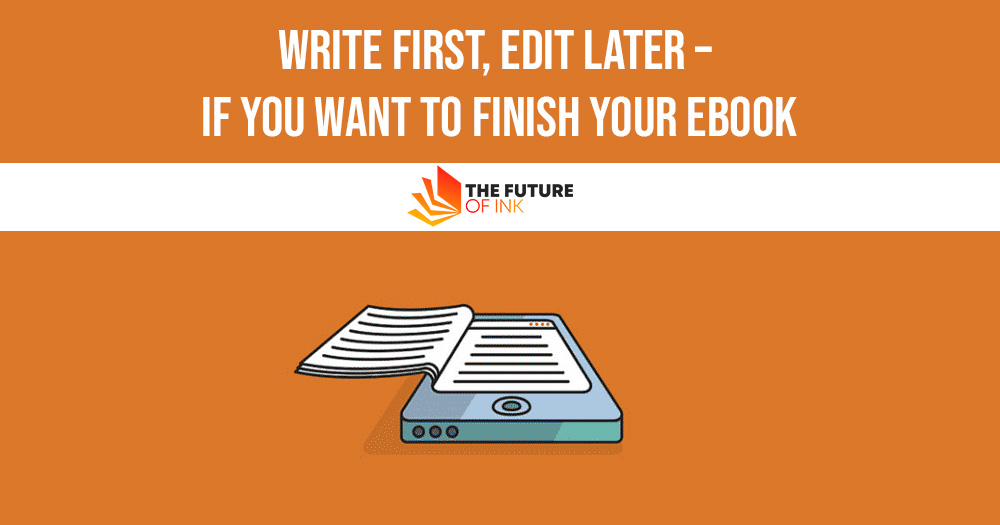Contents
You may have heard about your Inner Child. Maybe you’ve even heard of your Inner Parent. Did you know you also have an Inner Editor?
Sometimes also called the Inner Critic, the name you give this “other self” makes no difference; its function remains the same.
It finds mistakes in what you write and pushes you to fix them—NOW—before you write another word
Your Inner Editor causes you to continually go back over every sentence and fix it before you move forward to the next one.
It makes you pore over the first paragraph of every ebook you begin before it allows you to write the next paragraph and to get in the flow of writing the whole manuscript.
It requires you to print out the work you’ve completed and to edit the hard copy every day, making sure everything is correct in what you’ve already written before you start on any new content.


Editing has its place in the ebook-writing process—after you’ve written your whole manuscript.
If you allow your Inner Editor to join you daily in your ebook writing endeavors, each day you perfect a lot of what you’ve already written but you don’t produce a lot of additional material. Your writing periods primarily become editing periods.
The Inner Editor serves you well when you want to check your grammar or punctuation or find typos in your ebook manuscript; this is most necessary at the end of the ebook-writing process.
When you want to write your ebook, however, your Inner Editor can be a deterrent to the writing process and can become a distracting writing partner.
In fact, it can stop your fingers from hitting a key and keep you staring at the screen indefinitely. Or it can keep you continuously looping back to fix errors rather than moving forward by producing more content.
Also Read: How to Use Amazon to Determine the Market for Your Ebook?
Quieting the Inner Editor
If you want to get your ebook written—and written quickly, you must quiet (or even silence) your Inner Editor until you’ve written the first draft of your ebook.
You have to give yourself permission to write schlock the first time around without sensing any type of judgment. It’s important to feel you can just dump your thoughts on the paper, especially if you are a first-time writer.
Of course, it’s better to turn out great copy the first time around. And good planning prior to writing your ebook will help you do that.
Even if you’ve planned out the content for your book in fine detail, you may find yourself staring at the page and feeling stuck because you think the manuscript you produce must be brilliant.
No. The first draft does not have to be brilliant. That idea is what creates writer’s block. Don’t go there.
Don’t allow performance anxiety or fear of not being a good enough writer or having enough to say (or any other such thoughts) to get in your way. This is your Inner Editor standing over your shoulder and whispering in your ear.
Instead have a National-Novel-Writing-Month (NaNoWriMo) attitude. During NaNoWriMo, thousands of novelists write 50,000 words in 30 days. They write fast and furiously. And they don’t care if the manuscript they produce is lousy. It’s the first draft. They can fix it in December.

That’s when the editing process begins—and when the Inner Editor can take over the job.
I run a similar event during November called National Nonfiction Writing Month (NaNonFiWriMo), or Write Nonfiction in November (WNFIN); writers produce a work of nonfiction in 30 days as well—some with the same type of attitude.
To write your ebook without the “help” of your Inner Editor, write fast and don’t stop to make corrections.
5-Steps for Writing First, Editing Later
To write first and edit later, thus getting your ebook manuscript written without interference from your Inner Editor, try this five-step process:
1 – Give yourself a deadline
such as 30,000 words in 30 days. That’s 4 pages per day or 1,000 words per day. Alternatively, you can just have a word count per day (for example, 500 words per day) or a long-term deadline (for example, finish your ebook by March 30, 2013).
2 – Create a daily writing time
Actually, schedule this on your calendar. If you miss a day or fall behind, have a “make-up time” when you actually produce the missing word count for the week or generally catch up.
3 – Use timed writing periods
Get an egg timer or some other type of timer. Lots of free timers are available for computers, like Cool Timer, which is what I use. Set the timer for 30 minutes or one hour—whatever time period you have chosen.
4 – Write fast
When the timed writing period begins, write as fast as you can. Do not let your fingers pause over the keys for more than a few seconds.
Don’t let your Inner Critic have time to get a word in edgewise. This exercise is about content creation. You must write; you must create new content at all costs—even if it isn’t great. You’ll fix it later if need be.
5 – Don’t stop researching
If you find yourself hesitating because you think you need information or pausing to go look for something on the Internet, this could be your Inner Editor (or Inner Critic) saying you aren’t good enough, don’t know enough, aren’t an expert, or need to improve your writing with more information or data. (You might actually need some facts or quotes to back up what you have written, though.)
Don’t stop writing. Instead, put a note in your content (like you see below) that indicates the need for research.
For instance, you can use brackets and make a note to yourself about what research is necessary at that point in your manuscript. Highlight it so it’s easy to find later.

Don’t get caught up on the Internet or in a book researching rather than writing. Mark the place in your manuscript where you need to do research and then go back to it during the editing stage.
Also Read: How You Can Use Thunderclap To Promote Your Book (Video)
When to Listen to the Inner Editor
Once you have completed your first draft, it’s time to ask your Inner Editor to come back and join you. Now you want feedback on your grammar and punctuation.
It’s also the appropriate time for input on flow, sentence construction, and even the entire content and structure of your ebook.
That said, you must know when to tell your Inner Editor when enough is enough. Some writers don’t become authors because their manuscripts remain unfinished and unpublished. They never feel their work is complete—or perfect. You have to be able to say, “Done.”
The first time you say that comes when you hand the manuscript over to a professional editor. Every writer needs a professional editor; your Inner Editor will not suffice as your only editor.
Once the professional editor or editors (you may need more than one) complete their work and you make the changes they suggest, you will then again says, Done,” and go on to hire a professional proofreader.
When that job has been completed, you can officially and adamantly say, “DONE.”
If your Inner Editor says something different, politely (or not so politely), say, “Be quiet.”
Then send your manuscript off for conversion or to whatever service you plan to use to help you get your book uploaded and distributed to as many ereaders as possible. I’d love to have your feedback in the comments below…




